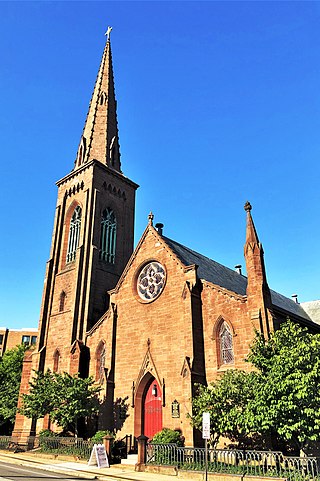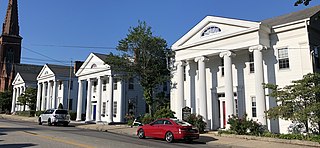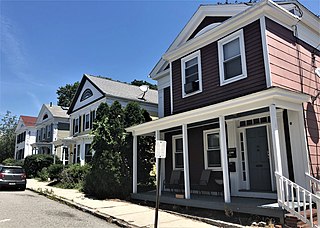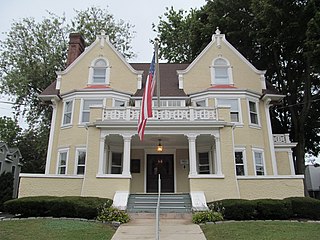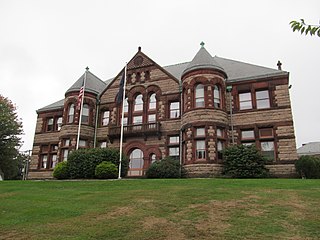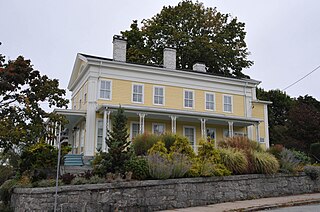Self-guided Sightseeing Tour #1 in New London, United States
Legend
Tour Facts
2 km
34 m
Experience New London in United States in a whole new way with our free self-guided sightseeing tour. This site not only offers you practical information and insider tips, but also a rich variety of activities and sights you shouldn't miss. Whether you love art and culture, want to explore historical sites or simply want to experience the vibrant atmosphere of a lively city - you'll find everything you need for your personal adventure here.
Individual Sights in New LondonSight 1: Saint James Episcopal Church
St. James Episcopal Church at 76 Federal Street at the corner of Huntington Street in New London, Connecticut is a historic church in the Episcopal Diocese of Connecticut. The congregation was founded in 1725, and the current church – the congregation's third – was built from 1847 to 1850 to designs in the Gothic Revival style by Richard Upjohn.
Wikipedia: St. James Episcopal Church (New London, Connecticut) (EN), Website, Heritage Website
Sight 2: Whale Oil Row
Whale Oil Row is a collection of four similar, high-quality Greek Revival houses standing side by side at 105–119 Huntington Street in New London, Connecticut. All were built for developer Ezra Chappel between 1835 and 1845 by Charles Henry Boebe, and they exemplify the wealth and taste of New London's whaling-funded upper class. They were added to the National Register of Historic Places in 1970.
Sight 3: Prospect Street Historic District
The Prospect Street Historic District encompasses approximately 5.5 acres northwest of the central business district of New London, Connecticut. The district is bounded by Bulkeley Place on the north, Hempstead Street on the west, Federal Street on the south and Huntington Street on the east. Prospect Street bisects the district on a north-south axis. The residential area includes 24 buildings, most of which are Greek Revival or Italianate houses built between 1838 and 1859. The area was developed in response to local demand for increased middle-class housing, and the dense development and modest scale of the buildings is reflective of this objective.
Wikipedia: Prospect Street Historic District (EN), Heritage Website
Sight 4: Williams Memorial Park Historic District
The Williams Memorial Park Historic District is located in New London, Connecticut, roughly bounded by Hempstead, Broad, Mercer and Williams Streets, with houses on Broad Street south to Cottage Street included. Williams Memorial Park – which was designed by Frederick Law Olmsted – is also included, as is the Civil War monument located there; 16 houses are part of the district, while two buildings – a brick office building at 43 Broad Street and an apartment building at 127 Hempstead Street, are non-contributing properties. Four of the six outbuildings in the district are contributing. Nine different architectural styles are represented in the district.
Wikipedia: Williams Memorial Park Historic District (EN), Heritage Website
Sight 5: Nathaniel Hempstead House
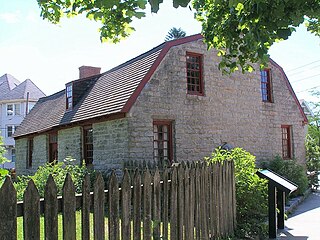
The Nathaniel Hempstead House, also known as the Old Huguenot House, is a historic house museum on Hempstead Street in New London, Connecticut. Built about 1759, it is an architecturally unusual stone house with a gambrel roof, a style not otherwise seen in the city. Because of its unusual form, it was thought to have been built by French Huguenot immigrants at an earlier date. The house is owned by Connecticut Landmarks, along with the adjacent Joshua Hempsted House, operating the pair as the Hempstead Houses museum. The house was listed on the National Register of Historic Places on December 2, 1970.
Sight 6: Williams Memorial Institute Building
The Williams School is a private co-educational secondary school in New London, Connecticut, that offers classes from 6th grade to 12th grade. It was founded as the Williams Memorial Institute (WMI) by Harriet Peck Williams in 1891, following the death of her son Thomas W. Williams II, a well-known whaling merchant.
Sight 7: Post Hill Historic District
The Post Hill Historic District encompasses the oldest settled area of New London, Connecticut.
Wikipedia: Post Hill Historic District (EN), Heritage Website
Share
How likely are you to recommend us?
Disclaimer Please be aware of your surroundings and do not enter private property. We are not liable for any damages that occur during the tours.
GPX-Download For navigation apps and GPS devices you can download the tour as a GPX file.
